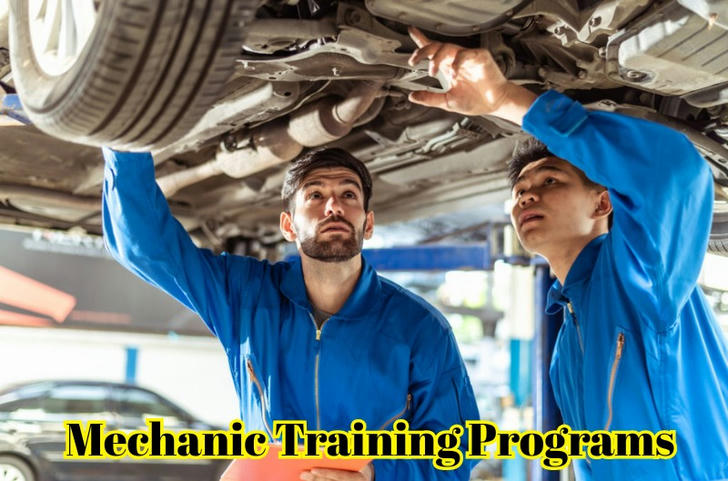Mechanic Training Programs That Prepare You for Real-World Jobs in the U.S.
Mechanic Training Programs|Mechanic Training
Looking to build a career with your hands and mind? Mechanic Training Programs across the United States offer job-ready skills, respected certifications. With growing demand for skilled automotive, diesel, and fleet mechanics, these programs provide a fast-track to stable employment without the burden of a four-year degree.

Why Choose Mechanic Training Programs in Today’s Job Market?
✅ High Job Demand: Over 67,000 new auto technician jobs expected by 2032 (U.S. Bureau of Labor Statistics).
✅ Hands-On Career: Learn in real shops, using real tools, solving real problems.
✅ National Certifications: Programs include preparation for ASE, EPA 609, and OEM credentials.
✅ Multiple Career Paths: From engine diagnostics to hybrid systems and diesel fleets.
Top Mechanic Training Programs in the U.S.
Below are some of the most trusted and accessible Mechanic Training Programs offering structured instruction and real-world experience:
🔧 Universal Technical Institute (UTI)
Format: Full-time, in-person (multiple U.S. campuses) Duration: 12–18 months Features: Manufacturer-specific training (Ford, BMW, Cummins) Certifications: ASE, OEM credentials Tuition Support: Employer sponsorships and military education benefits Eligibility: High school diploma or GED
🔧 ApprenticeshipUSA Automotive & Diesel Technician Programs
Format: Hybrid (on-the-job + classroom) Duration: 2–3 years Credentials: U.S. Department of Labor registered certificate Eligibility: Age 18+, legal to work in the U.S., physical readiness Locations: Available in most states through local unions and partner employers
🔧 Lincoln Tech Automotive Service Program
Format: In-person with flexible schedules Duration: 13–18 months Specialties: Electrical systems, drivetrains, brake systems Certifications: ASE certification preparation Financial Access: Employer-funded tools and graduation bonuses Eligibility: High school education or equivalent
🔧 Community College Mechanic Training Programs
Examples include Wake Tech (NC), Ivy Tech (IN), and Salt Lake Community College (UT) Format: Hybrid (online + shop labs) Duration: 12–24 months Focus: General automotive repair, emissions testing, hybrid vehicles Certifications: ASE A-series modules, state emissions licenses Admission Requirements: Local residency and placement assessments
Step-by-Step Guide to Enroll in Mechanic Training Programs
📌 Step 1: Compare Programs
Select by location, tuition model, and specialization (auto, diesel, hybrid).
📌 Step 2: Prepare Documents
Submit ID, proof of education, and career goals to program coordinators.
📌 Step 3: Seek Sponsored Options
Check for employer-partnered Mechanic Training Programs
📌 Step 4: Begin Training
Attend theory classes and complete lab/shop sessions under certified instructors.
📌 Step 5: Pass Certification Exams
Earn ASE or OEM credentials that unlock higher wages and job placement opportunities.
Who Benefits Most from Mechanic Training Programs?
🔹 Recent High School Graduates (18–24)
Seeking a faster, career-ready route to skilled employment.
🔹 Career Changers (25–50)
Leaving warehouse, retail, or construction jobs for more specialized and better-paid work.
🔹 Military Veterans
Utilizing GI Bill® benefits for structured career transition programs.
Skills Gained in Mechanic Training Programs
✅ Engine & Drivetrain Repair: Learn how to diagnose and rebuild gasoline and diesel engines.
✅ Electrical & Diagnostic Systems: Master scan tools, voltmeters, and modern ECU interfaces.
✅ Brake & Suspension Work: Hands-on experience with ABS, struts, and steering systems.
✅ Climate Control & HVAC: Earn EPA Section 609 certification for refrigerant handling.
✅ Safety & Documentation: Follow OSHA guidelines and complete digital service records accurately.
Mechanic Career Progression & Responsibilities
| Position Title | Core Responsibilities |
|---|---|
| Trainee Technician | Supports basic inspections, tire rotations, oil changes, and supervised diagnostics. |
| Certified Mechanic | Handles complete repairs, electrical diagnostics, and communicates with customers. |
| Master Technician | Leads advanced diagnostics, engine and transmission overhauls, and mentors junior staff. |
| Shop Manager / Fleet Supervisor | Oversees technician teams, coordinates workflow, manages shop operations and compliance. |
Final Thought: Why Mechanic Training Programs Matter Now
As cars become more advanced and the skilled labor shortage deepens, Mechanic Training Programs are no longer just an option—they’re a launchpad to high-income, respected careers. Whether you're fresh out of school or looking for a restart, there’s a program built to help you turn technical skills into long-term success.
